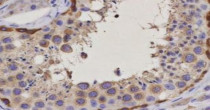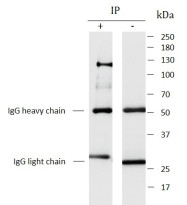ARG44637
anti-c-Cbl antibody
anti-c-Cbl antibody for IHC-Formalin-fixed paraffin-embedded sections,Immunoprecipitation,Western blot and Human
Overview
| Product Description | Mouse Monoclonal antibody recognizes c-Cbl |
|---|---|
| Tested Reactivity | Hu |
| Tested Application | IHC-P, IP, WB |
| Host | Mouse |
| Clonality | Monoclonal |
| Isotype | IgG1 |
| Target Name | c-Cbl |
| Antigen Species | Human |
| Conjugation | Un-conjugated |
| Alternate Names | CBL; Cbl Proto-Oncogene; RNF55; C-Cbl; CBL2; Cas-Br-M (Murine) Ecotropic Retroviral Transforming Sequence; Cbl Proto-Oncogene, E3 Ubiquitin Protein Ligase; Casitas B-Lineage Lymphoma Proto-Oncogene; RING-Type E3 Ubiquitin Transferase CBL; E3 Ubiquitin-Protein Ligase CBL; Signal Transduction Protein CBL; RING Finger Protein 55; Proto-Oncogene C-Cbl; Oncogene CBL2; Fragile Site, Folic Acid Type, Rare, Fra(11)(Q23.3); EC 2.3.2.27; EC 6.3.2; FRA11B; NSLL |
Application Instructions
| Application Suggestion |
|
||||||||
|---|---|---|---|---|---|---|---|---|---|
| Application Note | * The dilutions indicate recommended starting dilutions and the optimal dilutions or concentrations should be determined by the scientist. |
Properties
| Form | Liquid |
|---|---|
| Purification | Protein A purification |
| Buffer | PBS with 0.09% sodium azide |
| Preservative | 0.09% sodium azide |
| Storage Instruction | For continuous use, store undiluted antibody at 2-8°C for up to a week. For long-term storage, aliquot and store at -20°C or below. Storage in frost free freezers is not recommended. Avoid repeated freeze/thaw cycles. Suggest spin the vial prior to opening. The antibody solution should be gently mixed before use. |
| Note | For laboratory research only, not for drug, diagnostic or other use. |
Bioinformation
| Database Links | |
|---|---|
| Gene Symbol | CBL |
| Gene Full Name | Cbl Proto-Oncogene |
| Background | This gene is a proto-oncogene that encodes a RING finger E3 ubiquitin ligase. The encoded protein is one of the enzymes required for targeting substrates for degradation by the proteasome. This protein mediates the transfer of ubiquitin from ubiquitin conjugating enzymes (E2) to specific substrates. This protein also contains an N-terminal phosphotyrosine binding domain that allows it to interact with numerous tyrosine-phosphorylated substrates and target them for proteasome degradation. As such it functions as a negative regulator of many signal transduction pathways. This gene has been found to be mutated or translocated in many cancers including acute myeloid leukaemia, and expansion of CGG repeats in the 5' UTR has been associated with Jacobsen syndrome. Mutations in this gene are also the cause of Noonan syndrome-like disorder. [provided by RefSeq, Jul 2016] |
| Function | Recognizes activated receptor tyrosine kinases, including KIT, FLT1, FGFR1, FGFR2, PDGFRA, PDGFRB, CSF1R, EPHA8 and KDR and terminates signaling. Recognizes membrane-bound HCK, SRC and other kinases of the SRC family and mediates their ubiquitination and degradation. Participates in signal transduction in hematopoietic cells. Plays an important role in the regulation of osteoblast differentiation and apoptosis. Essential for osteoclastic bone resorption. The 'Tyr-731' phosphorylated form induces the activation and recruitment of phosphatidylinositol 3-kinase to the cell membrane in a signaling pathway that is critical for osteoclast function. May be functionally coupled with the E2 ubiquitin-protein ligase UB2D3. In association with CBLB, required for proper feedback inhibition of ciliary platelet-derived growth factor receptor-alpha (PDGFRA) signaling pathway via ubiquitination and internalization of PDGFRA. [UniProt] |
| Cellular Localization | Cell membrane, Cell projection, Cytoplasm, Golgi apparatus, Membrane. [UniProt] |
| Calculated MW | 100 kDa |
| PTM | Phosphoprotein, Ubl conjugation. [UniProt] |
Images (3) Click the Picture to Zoom In
-
ARG44637 anti-c-Cbl antibody IHC-P image
Immunohistochemistry: Human Testis stained with ARG44637 anti-c-Cbl antibody at 5 µg/mL dilution.
-
ARG44637 anti-c-Cbl antibody WB image
Western blot: THP1 stained with ARG44637 anti-c-Cbl antibody at 1 µg/mL dilution.
-
ARG44637 anti-c-Cbl antibody IP image
Immunoprecipitation: THP1 lysate immunoprecipitated with 2.5 µg of ARG44637 anti-c-Cbl antibody.








